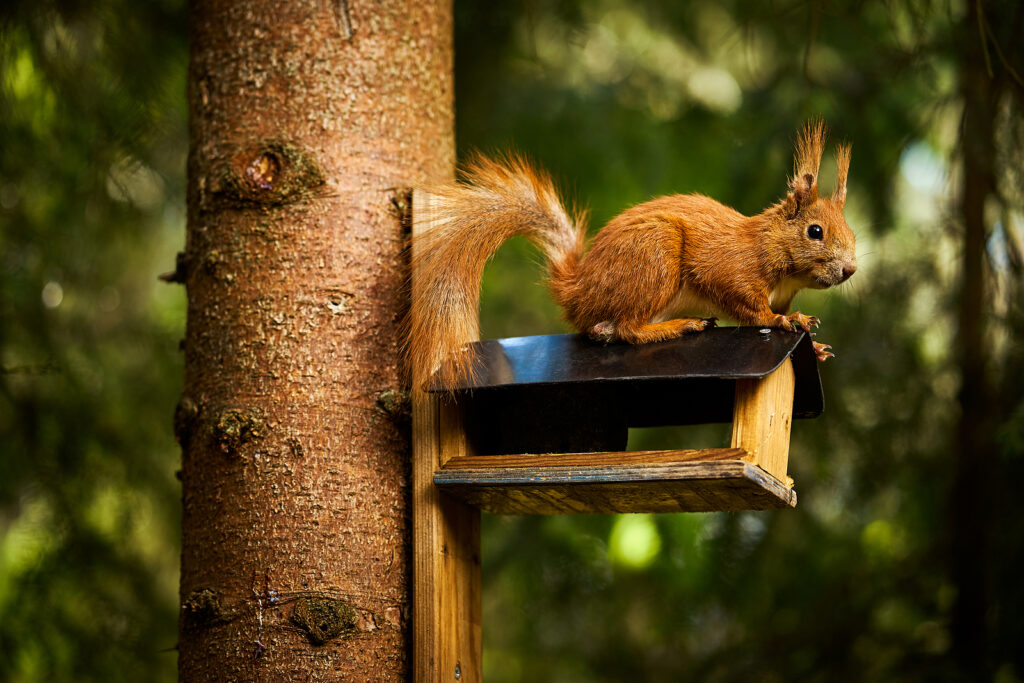As children, we have wonderful memories of feeding the ducks at the park pond, or refilling our bird feeders with seed and nectar. Feeding wildlife on separate grounds is consequence-free; but now that you are a homeowner, is it really a good idea to be feeding wildlife from your own backyard? The answer sits on a spectrum, yet tends to veer towards, “no.”
Continue reading to learn why feeding wild animals can cause problems, and what you can do if you are already in over your head with nuisance wildlife activity on your property.

The Most Common Problems with Feeding Local Wildlife
The animals that are near your property likely include the usual species found here in Tennessee, such as birds, squirrels, raccoons, opossum, and skunks. If you live near wooded areas or bodies of water, then you can expect a much steadier frequency of animal activity. So, when you combine such locations with such species, you can open the door to a world of trouble if you choose to feed wild animals on your property.
Wild Animals Will Come Back for More
These animals are already on a hunt for food every night. And when they find a steady food source, they will remember it for a long time. This means they will cease to stop visiting your property, night after night. And what’s worse is that if they do not find the food that has been provide before, they will continue their search around your property for some. This leads to the consequences we mentioned before.
Wild Animals are Very Destructive
Not only will wild animals remember that your property is a sure source for food and continue to visit each night with more and more friends, but they will also cause a load of destruction. Animals like raccoons have human-like paws that allow them to grip, grasp, rip, and tear. With this advantage, raccoons will rip up lawns in search of grubs, pillage gardens for fruits and vegetables, and even try to access the inner parts of your home through the siding, roof, or garage. Once inside, the level of destruction only worsens; plus, it poses several health and safety risks since wild animals are known carriers of several infectious diseases and parasites.
They Will Make Your Home Their Own
So once animals know your yard is the place to eat, they will begin to help themselves to whatever else they want on your property. This includes shelter. They will make their nests under your porch or deck, in crawl spaces and attics, outdoor sheds and garages, and even tree houses and play sets! Log piles and stationary vehicles are other popular nesting destinations for animals like raccoons, skunks, and opossum.
They Carry Infectious Diseases and Parasites
The biggest threat that goes along with feeding wild animals on your property is the risk of being attacked or infected. As mentioned, wild animals are known carriers of diseases, parasites, and more. They are also capable of attacking curious pets and children if provoked, ill, or protecting their young. It is in the best interest of your home and family to not feed wildlife around your property.
If you insist on feeding animals, try to follow these tips:
☑ Use an animal-specific feeder, such as a bird feeder or squirrel feeder.
☑ Reduce the amount of food in warmer seasons when natural food sources are more abundant.
☑ Place the food in a centralized location to deter animals from walking across your lawn.
☑ If over-crowding occurs, spread out your sources to prevent aggressive or competitive behaviors.
☑ If you see an animal abandoned, injured, or behaving oddly, contact a licensed Tennessee critter control company, ASAP.
Are you having nuisance critter and pest problems at home or the office? Contact Smoky Wildlife Control at 615-610-0962 for professional wild animal removal services in Nashville, Tennessee. We provide service in all surrounding counties and districts too.
You Might Also Read:
The Common Signs of Bats in the House
How to Keep Chipmunks Out of the Garden
FAQS About Animal Damages and Clean Up

